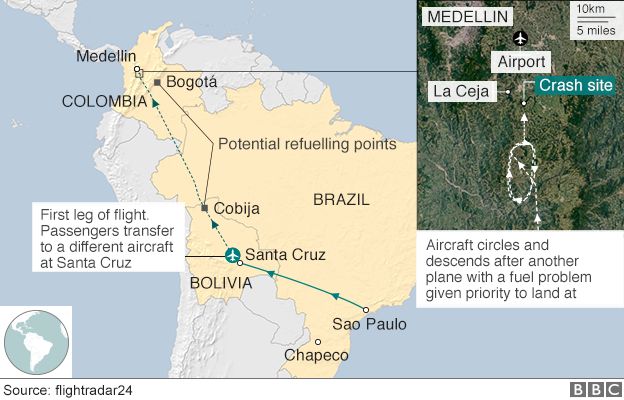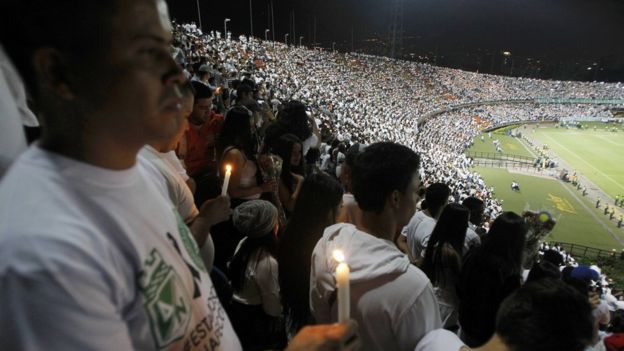Colombian authorities say evidence is growing that a plane carrying a Brazilian football team crashed because it ran out of fuel as it tried to land.
The plane had no fuel on impact, an official said, corroborating audio of the pilot asking to land because of a fuel shortage and electric failure.
The capital Bogota was mentioned on the flight plan as a possible refuelling stop, but the plane did not land there.
The plane plunged into a mountainside near Medellin late on Monday. Only six of the 77 people on board the plane survived.

“Having been able to do an inspection of all of the remains and parts of the plane, we can affirm clearly that the aircraft did not have fuel at the moment of impact,” civil aviation chief Alfredo Bocanegra told a news conference. Freddy Bonilla, another aviation official, said regulations stipulated that aircraft must have 30 minutes of fuel in reserve to reach an alternative airport in an emergency, but “in this case the plane did not have” it.
“The engines are the electrical source… but without fuel, obviously the electrical source would have been completely lost,” he added.
In a leaked tape, the pilot can be heard warning of a “total electric failure” and “lack of fuel”.
Just before the tape ends, he says he is flying at an altitude of 9,000ft (2,745m).
The plane was carrying the Brazilian football team Chapecoense, who had been due to play a cup final against Atletico Nacional in Medellin on Wednesday evening.


The team flew from Sao Paulo to Santa Cruz on a commercial flight, then switched to the chartered aircraft.
Brazil’s O Globo reported that because of a delayed departure, a refuelling stop in Cobija – on the border between Brazil and Bolivia – was abandoned because the airport did not operate at night.
The pilot had the option to refuel in Bogota, but headed straight to Medellin. “The pilot was the one who took the decision,” Gustavo Vargas, a representative of Lamia, which operated the plane, was quoted as saying in Bolivian newspaper Pagina Siete.
“He thought the fuel would last.”
Approaching Medellin, the pilot asked for permission to land because of fuel problems, without making a formal distress call.
But another plane from airline VivaColombia had priority because it had already suffered a fuel leak, the co-pilot of another plane in the air at the time said.
The pilot of the crashed plane is heard asking urgently for directions to the airport before the audio recording ends.
Officials say the plane’s “black boxes”, which record flight details, will be sent to the UK to be opened by investigators. A full investigation into the crash is expected to take months.
Source: BBC

Comments